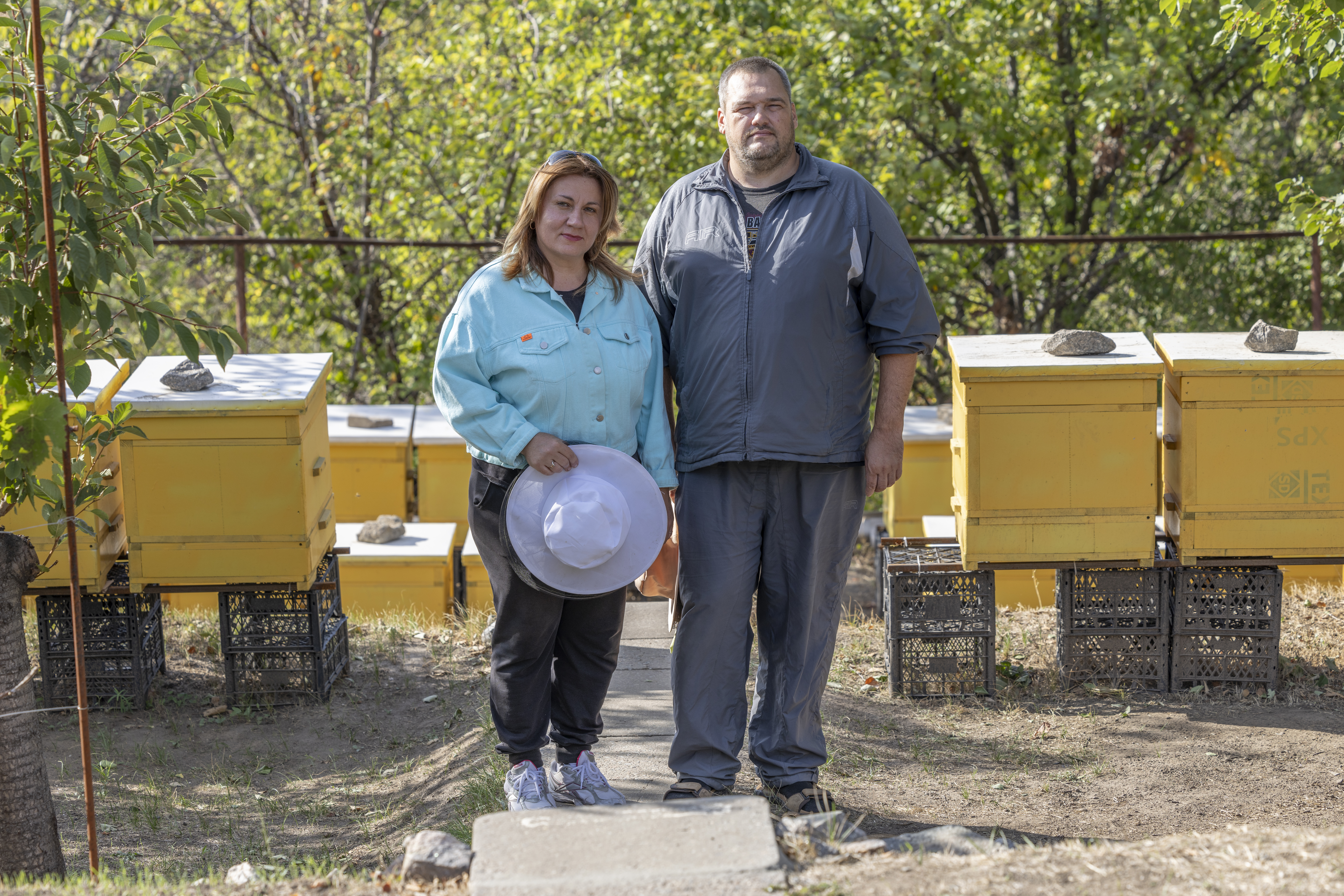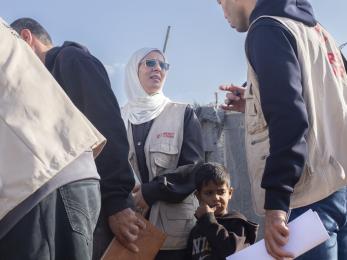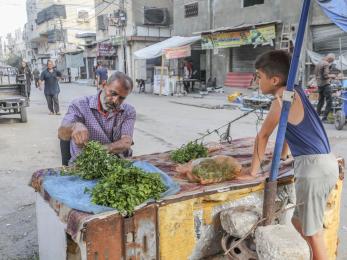In search of refuge: Ukraine war displaces millions
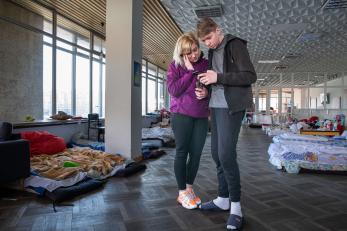
As the war wages on across Ukraine, families have been torn apart, thousands are injured or killed, and many more have been displaced. Mercy Corps has been on the ground in Ukraine, Poland, and Romania, partnering with and funding local organisations that know their community needs best and are providing assistance to refugees and Ukrainians inside the country. We have funded and partnered with dozens of organisations that are providing essential services, supplies, and shelter.
Families have made days-long treks, within Ukraine and to border countries, in hopes of finding safety and a place to rest. Across Ukraine, Poland, and Romania, we learned the stories of the families who found shelter at some of our partner organisations. We’re sharing their stories, highlighting the work of our local partners, and illuminating how the shelters for those who have been displaced can offer a brief respite amidst upheaval.
We are very grateful that we were welcome here in Lviv, that we were given a shelter.
Yulia Karpovets, Ukrainian refugee
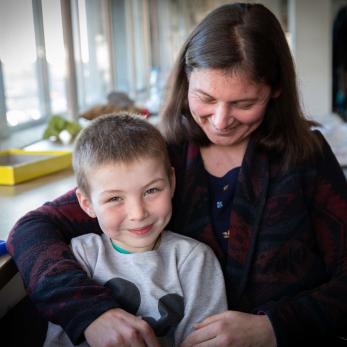
Yulia fled Zhytomyr with her two sons after their home’s windows shattered from nearby missile strikes. They’re staying at a shelter in Lviv, Ukraine, which used to be a cultural centre and now offers 40 displaced Ukrainian women with children a safe place to stay. It is one of the 350 shelters in Lviv. Many of those who work in the shelter are refugees themselves. Mercy Corps supports the shelter, serving the many families who have been displaced in eastern Ukraine. “Sometimes it's not convenient to accept help,” said Yulia. “We are used to doing everything ourselves. I worked as a cook. I want to go back to work.”
Yulia and her sons are part of the 7.1 million people who are displaced within Ukraine, with another 6.5 million who have fled the country since February 24. The Ukraine war has grown to be the fastest growing refugee crisis in Europe since World War II. Half of those who have fled the country are children. At least 15.7 million people remaining in Ukraine are in urgent need of humanitarian assistance.
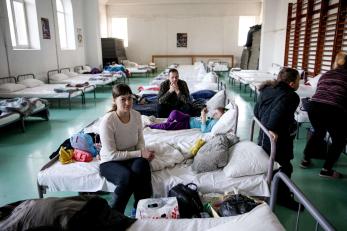
Trina and Alex and their children stayed at the Radauti refugee centre near the border crossing in northern Romania. Before reaching Romania, their five-year-old son had a foot infection from walking over glass and metal shards that covered the roads after explosions. Trini and Alex took turns carrying him on their backs as they walked to the border, where the refugee centre provided medical care for their son’s foot. “I don’t want to be a refugee,” said Trina. “We have always taken care of ourselves and worked hard. It is embarrassing for our family, but we are thankful that everyone has been so kind to us.”
From providing medical care and meeting basic needs, organisations on the ground are also helping with the logistics of relocating displaced families. When Trini and Alex arrived in Romania, they didn’t have the correct documents to leave the country. The refugee centre will help them obtain approved paperwork so they can continue on their journey to stay with family friends in Bulgaria.
At the onset of the crisis, Mercy Corps arrived at the Romanian border to assess the greatest needs for refugees. Mercy Corps continues to work in Romania with partner organisations to ship essential supplies into Ukraine, including food, baby food, face masks, medical supplies, hygiene products, and medicine.
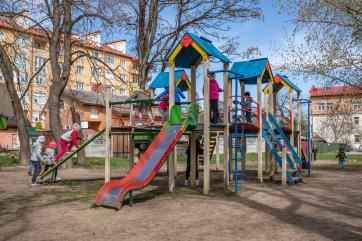
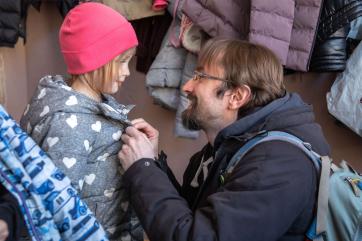
Around two-thirds of children in Ukraine are now displaced, either fleeing to nearby countries or are displaced within the country. In Ivano-Frankivsk, Ukraine, Mercy Corps partners with a local organisation called Kamyanytsya Austria to run a daycare centre for families who have been displaced by the war. The centre provides free childcare from morning until afternoon, giving children a safe space to play and learn—a sense of normalcy during a tumultuous time. While the children are taking trips to nearby parks and theaters, their parents take this time to figure out logistics of relocating their families.
“We have some children whose dads are in the army now, who are serving our country,” said teacher Denys Kvasov. “I feel grateful to them. And it’s kind of a trade, because they protect me—including all of us—and at the same time, I take care of their children, which is important for me.”
I want the war to end, I want people to be able to return home.
Mubariz Alimov, Third-country national
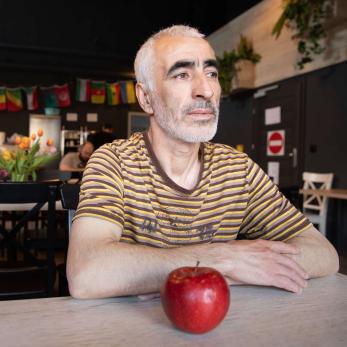
Mubariz Alimov, who is originally from Azerbaijan, was selling goods in a small Kyiv shop when the war began in Ukraine. After escaping to Poland, he is staying in a shelter for refugees, many of whom are non-Ukrainians who were living in Ukraine. Third-country nationals, along with Romani refugees, have experienced discrimation, difficulty finding transportation and accommodations, and face additional challenges as refugees because they often lack the documents required to legally work or travel within Europe.
Mubariz says he is grateful for the kindness he is being shown. The bakery down the street donates fresh bread to the shelter every day, and a nearby florist brings them flowers to brighten up the space. Kids run back and forth among the clothing donations that line the entrance. Before the war, the shelter was a hostel for sports camps, part of a skate park that takes up a large block on the outskirts of Warsaw, Poland. Through a partnership with the Polish organisation KIK (Klub Inteligencji Katolickiej, or Catholic Intelligentsia Club), Mercy Corps funds the hostel for those seeking refuge.
From distributing medical supplies and food staples to supporting marginalised groups like third-country nationals, Mercy Corps is acting quickly to help meet the urgent needs of the millions seeking refuge. Our collaboration with local community organisations in Ukraine, Poland, and Romania helps us to deliver support quickly and more effectively. By the end of 2022, Mercy Corps and our partners aim to reach at least 500,000 Ukrainians and other people in the region affected by the war with life-saving humanitarian aid.

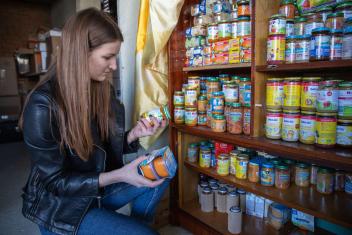
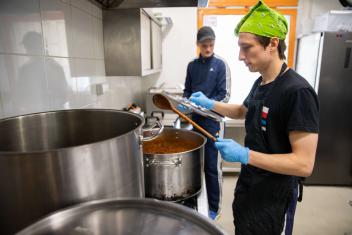
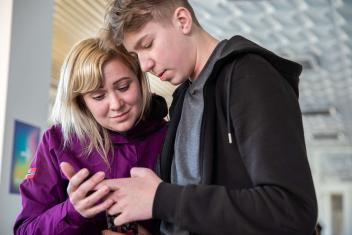
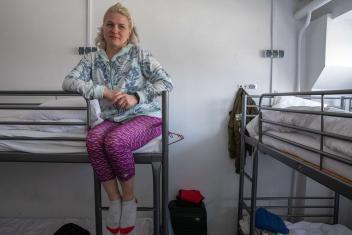
![Anjela Rabova (far right), stands with her father, Artyr, and two daughters. After sheltering in a cold, dark basement below their home, they fled Kharkiv to arrive in Warsaw, Poland. They are staying in a room funded by a Mercy Corps partner organisation. “Life is divided into before and after [the war]. We need to start life from the beginning,” said Anjela.](/sites/default/files/styles/slide_small_1x/public/2022-05/poland-202204-emillstein-0543-2048px.jpg?h=d1eab77d&itok=5MT6uUtW)
